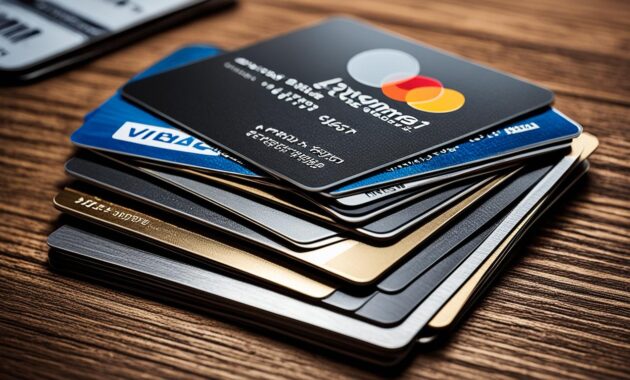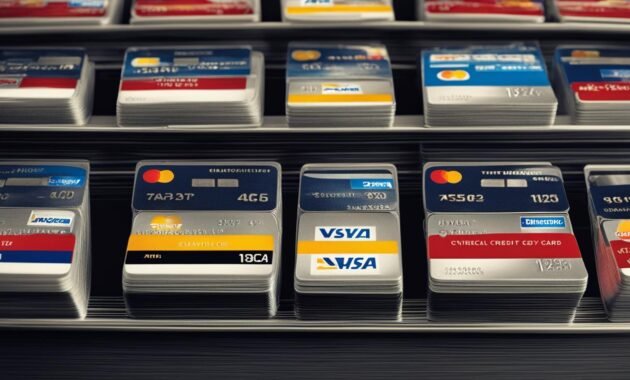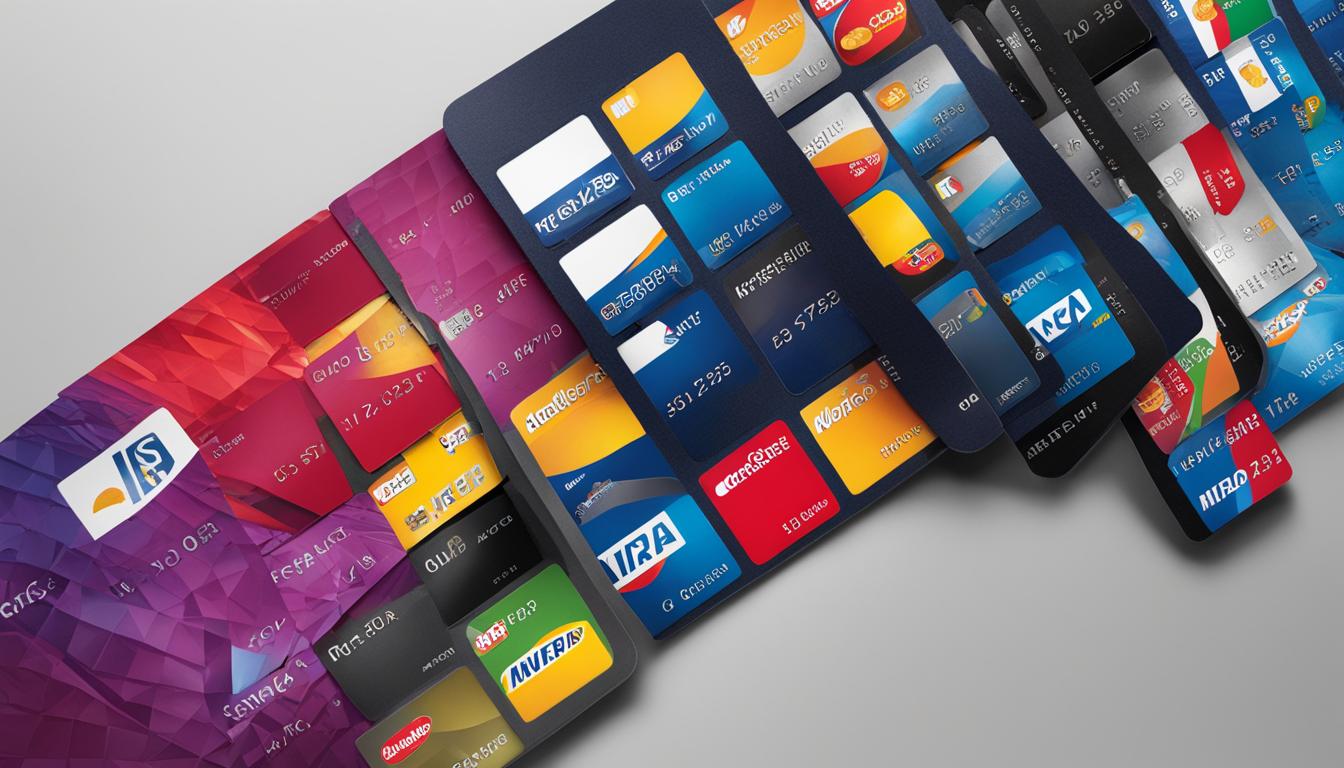When it comes to credit cards, there is no shortage of options available in the market. Whether you’re looking for a card that rewards your everyday spending, helps you build credit, or offers low-interest rates, there’s a credit card out there to suit your needs.
In this article, we will explore the different types of credit card options that you can consider. From rewards credit cards to travel credit cards, we’ll cover the major types of credit cards and their unique features. By understanding the variety of credit card options available, you can make an informed decision and choose the best credit card for your financial goals.
Key Takeaways: Types Of Credit Card
- There are various types of credit cards available to cater to different needs and financial goals.
- Rewards credit cards allow you to earn rewards based on your spending, such as cash back or travel points.
- Cash back credit cards offer cash back or statement credits on your purchases, either at a flat rate or in specific categories.
- Travel credit cards provide travel-related rewards, like points or miles, that can be redeemed for flights, hotels, and more.
- Business credit cards are designed for small business owners, offering rewards on business spending and separating personal and business expenses.
Rewards Credit Cards
Rewards credit cards are a popular type of credit card that allows cardholders to earn rewards or cash back based on their spending. These cards provide a way for individuals to make the most out of their everyday purchases and transactions. By using a rewards credit card, you can earn rewards on essential expenses that you already need to make, such as groceries, gas, or utility bills.
One of the main advantages of rewards credit cards is their flexibility in redeeming the earned points. Most rewards credit cards offer multiple options for redeeming points, including:
- Statement credits
- Gift cards
- Merchandise
This flexibility allows cardholders to choose the reward that best suits their needs and preferences. Whether you want to reduce your statement balance, treat yourself to a shopping spree, or save up for a special gift, rewards credit cards give you the freedom to decide.
There are various types of rewards credit cards available in the market, each offering its own set of benefits and reward structures. Let’s take a closer look at some of these types:
- Cash Back Credit Cards: These cards offer cash back rewards on eligible purchases. Cardholders can typically earn a percentage of their purchase amount as cash back, which is either credited to their account or received as a statement credit. Cash back credit cards are ideal for individuals who prefer immediate monetary rewards.
- Travel Rewards Credit Cards: These cards cater to frequent travelers and offer rewards in the form of points or miles. Cardholders can accumulate these rewards and redeem them for flights, hotel stays, car rentals, and other travel-related expenses. Travel rewards credit cards often come with additional perks such as airport lounge access and travel insurance.
By choosing the best rewards credit card that aligns with your spending habits and financial goals, you can maximize the benefits and value you receive from using a credit card. Consider factors such as the reward structure, annual fees, and any introductory offers when selecting the right card for you.
In the next section, we will explore cash back credit cards and how they can help you earn even more rewards on your spending.
Cash Back Credit Cards

Cash back credit cards offer a convenient way for cardholders to earn rewards or statement credits on their everyday spending. These cards are a popular choice for individuals who want to maximize their savings and earn money back on their purchases. Whether you’re a frequent traveler, a foodie, or a savvy shopper, there’s a cash back credit card that suits your lifestyle and spending habits.
There are two main types of cash back credit cards: flat-rate cash back cards and rotating cash back cards. Let’s take a closer look at each of these options:
Flat-Rate Cash Back Cards
Flat-rate cash back cards provide a consistent cash back rate on all purchases, regardless of the spending category. These cards typically offer a flat percentage cash back, such as 1.5% or 2%, on all eligible transactions. This means you’ll earn a fixed amount of cash back on every purchase you make with the card.
Flat-rate cash back cards are ideal for individuals who prefer simplicity and consistency. They are especially beneficial if you spend across various categories and want to earn a reliable cash back rate without the hassle of tracking rotating categories.
Rotating Cash Back Cards
Rotating cash back cards, also known as bonus category cash back cards, offer higher cash back rates in specific spending categories that change periodically. These categories can include dining, groceries, gas stations, or even online shopping. Typically, the card issuer will announce the cash back categories for each quarter or specific time period.
Rotating cash back cards can be a great option if you spend heavily in certain categories during specific periods. By aligning your spending with the bonus categories, you can earn higher cash back rates and maximize your rewards. However, keep in mind that your cash back rate for non-bonus category purchases may be lower compared to flat-rate cash back cards.
It’s important to review the terms and conditions of each cash back credit card to understand the specific cash back rates, redemption options, and any limitations or restrictions that may apply. By choosing the best cash back credit card for your needs, you can enjoy the benefits of earning cash back on your everyday purchases.
| Cash Back Credit Cards | Features |
|---|---|
| Card A | Flat 2% cash back on all purchases |
| Card B | 5% cash back on rotating categories with 1% cash back on all other purchases |
| Card C | 3% cash back on dining and entertainment, 2% cash back at grocery stores, 1% cash back on all other purchases |
Travel Credit Cards

If you’re a frequent traveler looking to maximize your rewards and enjoy exclusive perks, consider getting a travel credit card. These cards are specifically designed for individuals who want to earn rewards tailored to travel expenses. By using a travel credit card, you can earn points or miles that can be redeemed for various travel-related expenses, including flights, hotels, and car rentals.
One of the key benefits of travel credit cards is the flexibility they offer in earning and redeeming rewards. Some cards provide flexible travel rewards that can be used with any airline or hotel, giving you the freedom to choose the best options for your trip. Others may be affiliated with specific airlines or hotel loyalty programs, allowing you to earn rewards within those networks.
Travel credit cards often come with additional travel perks that can enhance your travel experience. These perks may include airport lounge access, annual travel credits that offset the cost of travel expenses, and credits for programs like Global Entry or TSA PreCheck for expedited airport security screening.
Types of Travel Credit Cards
Travel credit cards come in different varieties to suit various travel preferences and spending habits. Here are some common types of travel credit cards:
- Airline-Specific Travel Credit Cards: These cards are affiliated with a particular airline and offer rewards and benefits within that airline’s frequent flyer program. They often provide bonus miles for purchases made with the airline and may offer perks like priority boarding or free checked bags.
- Hotel-Specific Travel Credit Cards: These cards are affiliated with a specific hotel chain and offer rewards within the hotel’s loyalty program. Cardholders can earn points for stays at the hotel, enjoy elite status benefits, and receive special discounts or room upgrades.
- General Travel Credit Cards: These cards provide more flexibility as they offer rewards that can be redeemed with any airline or hotel. They often have higher earning rates on travel-related expenses and may offer additional benefits like travel insurance or concierge services.
When choosing the best travel credit card for you, consider factors such as annual fees, earning potential, redemption options, and the specific benefits that align with your travel preferences and goals.
With a travel credit card, you can turn your everyday spending into travel rewards and enjoy the perks and benefits that come with it. Whether you’re a frequent flyer or someone who loves exploring new destinations, a travel credit card can be a valuable tool for making your travel experiences even more rewarding.
Business Credit Cards

Business credit cards are an essential tool for small business owners and entrepreneurs. These cards provide a convenient way to manage expenses and keep personal and business finances separate. Moreover, they offer various benefits, including rewards on business spending and features designed specifically for the unique needs of businesses.
If you own a business or engage in income-producing activities, you may be eligible to apply for a business credit card. With a business credit card, you can earn rewards on your business purchases and enjoy perks that can help you save money and streamline your operations.
One of the key advantages of business credit cards is the ability to keep personal and business expenses separate. This separation is crucial for accurate accounting, tax filing, and financial transparency. By using a business credit card for your company’s expenses, you can easily track and manage your business-related transactions.
Business credit cards come in various types, including:
- Cash back cards
- General rewards cards
- Travel cards
- Secured cards
Each type of business credit card offers unique features and benefits. Cash back cards allow you to earn a percentage of your spending back as cash rewards, while general rewards cards offer points or miles that can be redeemed for a variety of rewards. Travel cards are specially designed for businesses that frequently travel, offering travel-related perks and rewards. Secured cards may be an option for businesses with limited credit history or those looking to establish or rebuild credit.
Business credit cards often include expense tracking tools and reporting features that help you monitor and analyze your business spending. These tools can significantly simplify financial management by providing detailed statements and categorizing expenses. Additionally, business credit cards typically offer higher credit limits compared to personal credit cards, allowing for greater purchasing power and flexibility.
Student Credit Cards
Student credit cards are specifically designed for college students who are new to credit or have a limited credit history. These cards are an excellent tool for building credit and establishing a positive credit history.
Student credit cards often come with lower credit limits and may offer rewards for every dollar spent. They typically have relaxed approval requirements compared to other types of credit cards, making it easier for students with limited or no credit history to qualify.
Building credit is important for young adults as it sets the foundation for future financial opportunities. Student credit cards provide a means for students to start building their credit history responsibly while enjoying the convenience and benefits of having a credit card.
By making regular on-time payments and keeping credit utilization low, students can gradually improve their credit scores and expand their credit options. This can be especially beneficial when it comes to qualifying for loans, renting an apartment, or even applying for future credit cards with higher limits and better rewards.
In addition to building credit, student credit cards often come with perks and rewards tailored to a student’s lifestyle. From cash back on everyday purchases to discounts on textbooks or streaming services, these cards can provide valuable savings and benefits for students.
“Student credit cards are a great way for college students to start building a positive credit history while enjoying the benefits of having a credit card. With lower credit limits and relaxed approval requirements, they provide an accessible option for students looking to establish credit and manage their finances responsibly.”
Benefits of Student Credit Cards
1. Establishing Credit: Student credit cards help students establish a credit history and build a positive credit score from an early age.
2. Lower Credit Limits: These cards often come with lower credit limits, which can help students manage their spending and avoid excessive debt.
3. Rewards and Perks: Many student credit cards offer rewards or benefits tailored to student needs, such as cash back on dining, groceries, or entertainment.
4. Financial Education: Some student credit cards provide resources and tools to help students learn about credit management and develop good financial habits.
5. Convenient Payment Method: Having a credit card can be convenient for online purchases, emergencies, or building a credit reserve.
Considering the Best Student Credit Card
When choosing the best student credit card, it’s important to consider the following factors:
- Approval Requirements: Look for cards with relaxed approval requirements for students with limited or no credit history.
- Interest Rates and Fees: Compare the APR, annual fees, and other charges associated with the card to ensure they align with your financial goals.
- Rewards Program: Evaluate the rewards program to see if it offers benefits and rewards that align with your spending habits and preferences.
- Financial Education: Check if the credit card issuer provides educational resources and tools to help students learn about credit management.
- Additional Benefits: Consider any additional perks or benefits, such as purchase protection, extended warranty, or travel insurance, that may be valuable to you as a student.
A good student credit card is one that not only helps you build credit but also provides valuable rewards and benefits that enhance your college experience. Take the time to research and compare different student credit card options to find the best fit for your financial needs and goals.
Remember, responsible credit card usage is key to building credit and avoiding debt. Make sure to pay your bills on time, keep your credit utilization low, and only charge what you can afford to pay off each month.
Secured Credit Cards

Secured credit cards provide a viable option for individuals with bad credit or no credit history to start their credit-building journey. These cards require a security deposit, which serves as collateral for the credit card issuer. The credit limit of a secured credit card is usually equal to the amount of the security deposit.
Secured credit cards are an effective tool for building or rebuilding credit. By demonstrating responsible credit usage and consistent payment history, cardholders can establish a positive credit record. Over time, this can lead to improved credit scores and increased eligibility for other credit products.
“Secured credit cards are a great option for individuals who need to establish or rebuild their credit history. By responsibly managing a secured credit card, cardholders can show lenders that they can handle credit responsibly.”
– Jane Smith, Credit Expert
Key Benefits of Secured Credit Cards
- Opportunity to build credit history
- Can be obtained even with bad credit or no credit history
- Security deposit helps determine credit limit
- Accepted by most merchants like regular credit cards
- Can help qualify for an unsecured credit card in the future
Choosing the Best Secured Credit Card
When selecting a secured credit card, it’s essential to consider factors such as annual fees, interest rates, and any additional benefits like credit monitoring or educational resources. Some secured credit cards may also offer a pathway to transition to an unsecured credit card after consistent responsible credit behavior.
Here is a comparison table showcasing some of the best secured credit cards available:
| Credit Card | Annual Fee | APR | Security Deposit | Additional Benefits |
|---|---|---|---|---|
| Bank A Secured Card | $0 | 17.99% | $500 – $5,000 | Free credit monitoring |
| Credit Builder Card | $29 | 19.99% | $300 – $2,500 | Access to Credit Score Simulator |
| SecureStart Card | $39 | 15.99% | $200 – $3,000 | Automatic credit limit increase after 6 months of on-time payments |
Note: The above-mentioned credit cards are for illustrative purposes only. It’s important to conduct thorough research and compare different secured credit cards to find the best one that suits individual needs.
Secured credit cards offer an opportunity for individuals to build credit and demonstrate their creditworthiness. By responsibly managing a secured credit card and making timely payments, individuals can pave the way toward a stronger credit profile and increased financial options.
Low-Interest Credit Cards

Low-interest credit cards are an excellent choice for individuals looking to minimize interest charges when carrying a balance on their credit card. These cards offer a lower ongoing interest rate compared to the average credit card APR, making them a cost-effective solution for financing new purchases or transferring balances from high-interest credit cards. Additionally, some low-interest credit cards provide introductory 0% APR on new purchases, allowing cardholders to save even more on interest in the initial period.
When considering low-interest credit cards, it’s crucial to evaluate both the duration of the introductory offer and the ongoing interest rate. This ensures you make an informed decision and choose a card that aligns with your financial goals. Whether you’re working on financing new purchases or consolidating debt, a low-interest credit card can help you save money and manage your finances wisely.
Benefits of Low-Interest Credit Cards:
- Minimize interest charges on carrying a balance.
- Save money when financing new purchases.
- Pay off debt faster with lower interest rates.
- Consolidate high-interest credit card balances.
Considerations when Choosing a Low-Interest Credit Card:
- Introductory 0% APR duration.
- Ongoing interest rate after the introductory period.
- Balance transfer options and fees.
- Rewards or additional perks.
| Credit Card | Introductory APR | Ongoing APR | Annual Fee | Rewards |
|---|---|---|---|---|
| Card A | 0% for 15 months | 14.99% – 24.99% | $0 | Cash back on select categories |
| Card B | 0% for 12 months | 12.99% – 22.99% | $95 | Travel rewards |
| Card C | No introductory APR | 10.99% – 20.99% | $0 | No rewards |
Choosing the Best Credit Card

When it comes to selecting the best credit card for your financial needs, there are several factors to consider. Your credit score, spending habits, and financial goals should all play a crucial role in your decision-making process.
First and foremost, it’s important to evaluate your credit score to determine what credit card offers you may be eligible for. Lenders typically offer different credit cards based on creditworthiness, with better rewards and benefits available to those with higher scores.
Next, think about what you want the credit card to do for you. Are you looking to build credit? Earn rewards for your everyday spending? Save on interest charges? Finance new purchases? By identifying your priorities, you can narrow down your choices and focus on credit cards that align with your specific goals.
Consider your spending habits. Do you tend to spend more on groceries, dining out, travel, or other specific categories? Look for credit cards that offer bonus rewards or cash back in those areas. Additionally, if you frequently travel, you may want to explore travel credit cards that provide flexible travel rewards or rewards within specific airlines or hotel loyalty programs.
Financial goals also play a significant role in choosing the best credit card for your needs. Whether you want to save money on interest, improve your credit score, or simply maximize your rewards, different credit cards offer various features to help you achieve your objectives.
To make an informed decision, ask the right questions and compare the features of different credit cards. Look for key information such as annual fees, interest rates, rewards structure, redemption options, and any additional perks or benefits. By carefully considering these factors, you can select a credit card that offers the highest overall value based on your personal needs and preferences.
| Factors to Consider | Importance |
|---|---|
| Credit Score | Determines eligibility for credit card offers |
| Spending Habits | Influences rewards structure and benefits |
| Financial Goals | Aligns credit card features with your objectives |
| Annual Fees | Affects the cost of owning the credit card |
| Interest Rates | Determines the cost of carrying a balance |
| Rewards Structure | Earns you points, cash back, or miles |
| Redemption Options | How you can use your earned rewards |
| Additional Perks or Benefits | Extra features like travel insurance or concierge services |
Also Read : Safeguarding Your Credit Card Security Code
Conclusion
Finding the right credit card can have a significant impact on your financial well-being. By understanding the different types of credit cards available and considering your individual needs and financial goals, you can make an informed decision and choose a credit card that aligns with your spending habits and objectives.
Regularly reviewing and reassessing your credit card options is crucial to ensure that you are maximizing your rewards and making the most of your financial opportunities. As your spending habits and financial goals may change over time, it’s essential to stay informed about new credit card offers and promotions that may better suit your needs.
Remember, the right credit card can help you earn valuable rewards, save on interest charges, build credit, and even enhance your travel experiences. Take the time to evaluate your options carefully, comparing the features, benefits, and fees of different credit cards. By doing so, you can make a choice that supports your financial objectives and sets you on a path to financial success.
FAQs
Q: What are the different types of credit cards available?
A: There are several types of credit cards available such as store credit cards, co-branded credit cards, unsecured credit cards, rewards cards, and traditional credit cards.
Q: What is a store credit card?
A: A store credit card is a type of credit card that is issued by a specific retail store or a chain of stores. It can usually only be used to make purchases at that specific store or its affiliates.
Q: What is a co-branded credit card?
A: A co-branded credit card is a card that is sponsored by both a retailer and a credit card issuer. It offers special benefits and rewards when used for purchases with the sponsoring retailer.
Q: What is an unsecured credit card?
A: An unsecured credit card is a traditional credit card that does not require collateral or a security deposit. It is based on the cardholder’s creditworthiness and income.
Q: How can I find the best credit card for my needs?
A: You can find the best credit card for your needs by considering factors such as rewards, interest rates, fees, and your credit score. It’s important to compare different offers and choose a credit card that suits your spending habits and financial goals.
Q: What should I consider when choosing a credit card?
A: When choosing a credit card, you should consider the annual fees, APR, rewards programs, credit limit, and the terms and conditions. It’s also important to use the credit card responsibly to avoid accumulating debt.
Q: Can I qualify for a credit card with little to no credit history?
A: Yes, you can qualify for a credit card with little to no credit history. There are options such as secured credit cards or student credit cards designed for individuals with limited credit history.
Q: What are rewards cards and how do they work?
A: Rewards cards are credit cards that offer incentives and benefits for making purchases. These rewards may include cash back, travel points, or discounts on specific categories of spending. Cardholders earn rewards based on their spending and can redeem them for various perks.
Q: How can I build my credit using a credit card?
A: You can build your credit by using a credit card responsibly, making timely payments, and keeping your credit utilization low. Over time, this can help you establish a positive credit history and improve your credit score.
Q: What is the difference between a traditional credit card and a secured credit card?
A: A traditional credit card is unsecured and does not require collateral, whereas a secured credit card requires a security deposit as collateral. Secured credit cards are often used by individuals with no credit history or poor credit to rebuild their credit.
Source Links
- https://www.bankrate.com/finance/credit-cards/how-to-choose-your-next-credit-card/
- https://www.bankrate.com/finance/credit-cards/different-types-of-credit-cards/
- https://www.nerdwallet.com/article/credit-cards/how-to-pick-the-best-credit-card-for-you-4-easy-steps
